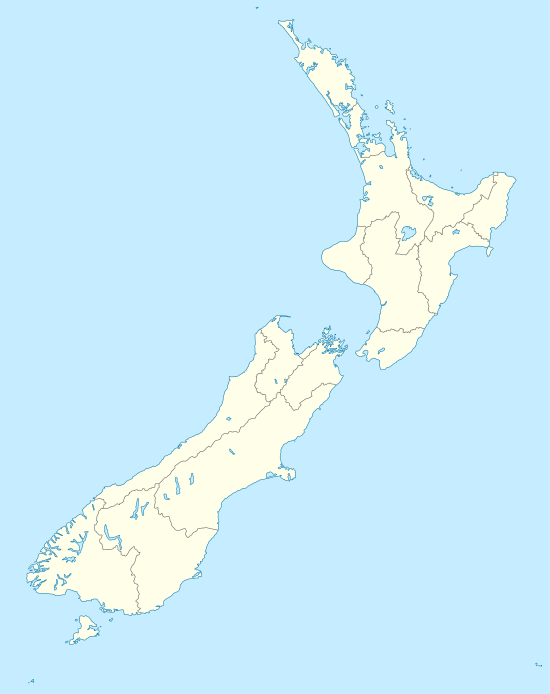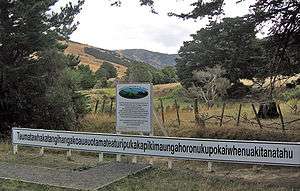Taumatawhakatangihangakoauauotamateaturipukakapikimaungahoronukupokaiwhenuakitanatahu

Taumatawhakatangihangakoauauotamateaturipukakapikimaungahoronukupokaiwhenuakitanatahu[1] is a hill near Porangahau, south of Waipukurau in southern Hawke's Bay, New Zealand. The height of the hill is 305 metres (1,001 ft). The hill is notable primarily for its unusually long name, which is of Māori origin; it is often shortened to Taumata for brevity.[2] It has gained a measure of fame as it is the longest place name found in any English-speaking country, and the second-longest place name in the world, according to Wises New Zealand Guide and The New Zealand Herald.[3] The name of the hill (with 85 characters) has also been listed in the Guinness World Records as the longest place name. Other versions of the name, including longer ones, are also sometimes used.
Pronunciation
|
|
Broken down by syllable, the full place name is pronounced: Tau-ma-ta-fa-ka-ta-ngi-ha-nga-ko-au-au-o-ta-ma-te-a-tu-ri-pu-ka-ka-pi-ki-mau-nga-ho-ro-nu-ku-po-kai-fe-nu-a-ki-ta-na-ta-hu (40 syllables). Note that in the Maori language the digraph "wh" is pronounced as /f/.
Meaning of the name
The name "Taumatawhakatangihangakoauauotamateaturipukakapikimaungahoronukupokaiwhenuakitanatahu" translates roughly as "The summit where Tamatea, the man with the big knees, the slider, climber of mountains, the land-swallower who travelled about, played his nose flute to his loved one".
Other versions
Some forms of the name are longer still: "Taumatawhakatangihangakoauauotamateaurehaeaturipukakapikimaungahoronukupokaiwhenuakitanatahu" has 92 letters. An even longer version, Taumata-whakatangihanga-koauau-o-Tamatea-haumai-tawhiti-ure-haea-turi-pukaka-piki-maunga-horo-nuku-pokai-whenua-ki-tana-tahu, has 105 letters and means "The hill of the nose-flute playing by Tamatea – who was blown hither from afar, had a slit penis, grazed his knees climbing mountains, fell on the earth, and encircled the land – to his beloved one".[4]
The New Zealand Geographic Placenames Database, maintained by Land Information New Zealand (LINZ), uses the somewhat shorter (57-character) name "Taumatawhakatangihangakoauauotamateapokaiwhenuakitanatahu".[5]
Tamatea, explorer of the land

Tamatea-pōkai-whenua (Tamatea the explorer of the land) was the father of Kahungunu, ancestor of the Ngāti Kahungunu iwi.[6] Mention of Tamatea's explorations of the land occur not only in Ngāti Kahungunu legends, but also in the traditions of iwi from Northland, where he is said to have explored the Hokianga and Kaipara harbours.
In traditions from the Bay of Plenty region, he left a son, Ranginui, who is the ancestor of Ngāti Ranginui of Tauranga. Legends from the East Coast of the North Island tell of his explorations in Tūranga-nui (Gisborne), Māhia, Wairoa, Ahuriri (Napier), Heretaunga (near Hastings) and Pōrangahau. He travelled via the Mangakopikopiko River, over the Tītī-o-kura saddle via Pohokura to Lake Taupo. The Ōtamatea River and swamp is named after him. Tamatea is also the name of a place in Napier.
Early South Island legends say that Tamatea sailed down the east coast. His canoe was wrecked in the far south, and transformed into Tākitimu mountain range. Tamatea then returned to the North Island, and travelled via the Whanganui River.[7]

In popular culture
The name is featured in a Mountain Dew jingle and a SEEK Learning TV ad in Australia.[8] It also appears in the 1976 (re-released in 1979) single "The Lone Ranger" by British band Quantum Jump, which featured in the title sequence of the second series of The Kenny Everett Video Show. It is the subject of a 1960 song by the New Zealand balladeer Peter Cape.[9]
Tennis star Martina Navratilova learned to say the word when she was ten years old.[10]
See also
References
| Wikimedia Commons has media related to Taumata. |
Coordinates: 40°20′46″S 176°32′25″E / 40.346°S 176.5402°E
- ↑ This spelling is based on the sign located on the hill itself, two versions of which are shown in photographs shown in this article.
- ↑ Reed, A. W. (2010). Peter Dowling, ed. Place Names of New Zealand. Rosedale, North Shore: Raupo. p. 392. ISBN 9780143204107.
- ↑ NZPA (Aug 11, 2003). "Nasa turns to Kiwi when it needs expert space advice". New Zealand Herald. Retrieved 2011-03-28.
Three years ago, Mr Coleman, a website designer, posted a message on an internet bulletin board about Taumatawhakatangihangakoauauotamateapokaiwhenuakitanatahu in southern Hawkes Bay. It is the second-longest place name in the world, according to Wises New Zealand Guide.
- ↑ George C. Denniston; Frederick Mansfield Hodges; Marilyn Fayre Milos (2001-10-31). Understanding Circumcision: A Multi-Disciplinary Approach to a Multi-Dimensional Problem. Springer. p. 130. ISBN 978-0-306-46701-1.
- ↑ "Place name detail: Taumatawhakatangihangakoauauotamateapokaiwhenuakitanatahu". New Zealand Gazetteer. Land Information New Zealand. Retrieved 17 March 2018.
- ↑ Te Ahukaramū Charles Royal (21 September 2007). "Papatūānuku – the land". Te Ara: The Encyclopedia of New Zealand. Archived from the original on 3 April 2009. Retrieved 14 June 2018.
- ↑ Taonui, Rāwiri (21 September 2007). "Ngā waewae tapu – Māori exploration". Te Ara: The Encyclopedia of New Zealand. Archived from the original on 15 June 2009. Retrieved 14 June 2018.
- ↑ "Long Name, Bro – Learnings from SEEK Learning". Retrieved 10 February 2015.
- ↑ New Zealand Folk Song: Peter Cape According to this source, Cape calls it "Taumata".
- ↑ Louisa Wall (March 29, 2011). "A real show from the titans of tennis". New Zealand Herald. Retrieved 2011-03-28.
And on a rainy day in Czechoslovakia, a bored 10-year-old Navratilova learned one of the longest place names in the world. Little did she know that one day she would be in New Zealand, saying Taumatawhakatangihangakoauauotamateapokaiwhenuakitanatahu to compliment her thanks to the people of Tamaki Makaurau for their hospitality.